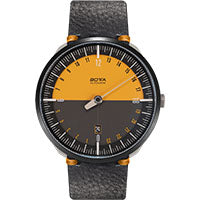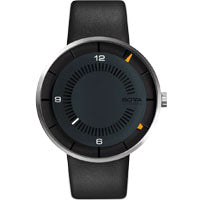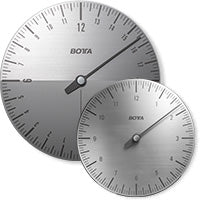Why should I spend 800 Euro for a wristwatch when I can get a similar looking watch for 80 Euro? On the other hand, why should I spend 8,000 euros when I can get a genuine quality product with excellent components for a tenth of the price?
Both questions cannot be answered simply by material or practical added value. All three types of watches show the time - and all of them are pretty accurate. In case of doubt, the cheap watch - thanks to quartz technology - is even the most accurate and robust.
The explanation for the incredibly low price of the first category is mainly due to the manufacturing and marketing. Manufacturing prices of a few Euros can only be realized by mass production under extreme conditions and the use of cheap materials.
Mass products created in this way often still look relatively elaborate and interesting at first glance. Not seldomly they quit their service however after shortest time. A repair is usually not worthwhile anyway, because it would exceed the purchase price considerably. In general, such products are not repaired at all, but replaced at best. So you "dispose" of them immediately and buy a new cheap product again. Sounds reasonable and logical at first.
But this attitude has significant disadvantages:
One makes an effective contribution to active environmental pollution (one supports short-lived products with a short life span and harmful ingredients).
Possessing and wearing such products often gives only short pleasure - if at all (What else should one be happy about, except that one has made a supposed bargain).
A self-debasement takes place. Sounds a bit exaggerated - but it is verifiable. The subconscious sets the product value in relation to the self value.
The message against self-esteem is further strengthened if the cheap product fails its service or shows defects after a disproportionately short time. Here, too, the subconscious creates analogies to self-esteem. Of course, such an event will not acutely trigger a personal crisis of meaning, but there is always a small minus point on the self-esteem score.
If one consistently surrounds oneself with such cheap products, a permanent devaluation and confirmation of alleged inferiority actually takes place. There is also the same phenomenon with reversed cause-and-effect causality: namely that people with a low self-esteem generally tend towards low-quality products.
...or too expensive. Psychologists then speak of a compensatory action. In other words, the desire to increase one's own intrinsic value through particularly expensive products (external value). Here, to stay with our watch example, the extremely expensive watches are located. This is why such products are often referred to as "ego prostheses".
Although there is no devaluation here, the wearers experience their ownership as stressful and unsatisfactory, because the hoped-for confirmation by his environment often fails to materialize.
In most cases this behavior is even criticized as showing off. A genuine internal revaluation does not take place naturally also here, because the own subconscious naturally sees through the superficial measure and does not permit a genuine substantial revaluation.
So how do you do it right?
This question cannot be answered in a generalized and universally valid way. Here everyone must find his or her own "comfort zone".
In any case, I would advise you to surround yourself with high-quality products in general and without exception.
These do not necessarily have to be the very expensive ones. The products with the best price-performance ratio are often found in the upper middle range. Cheap products (no matter if clothes, commodities or food) should be banished from life as far as possible. Very often it is possible to save on quantity and thus increase the quality without increasing the expenses. Be it food, clothing or consumer products.
In general, one should prefer products where price and performance are in a reasonable and comprehensible relation. In our world these are mostly products in the above mentioned middle to upper price segment. One should consider that the personal perceived price relation is clearly distorted downwards by the cheap mass products.
Valuable products, which are produced with reasonable effort and in a humane manner, have a price that may initially seem relatively high to us. In fact, such products are not really more expensive than cheap products in terms of TCO (Total Cost of Ownership). Because normally they last much longer, can be maintained and repaired and prevent frustration and replacement stress.
And - very important - they are also much, much more fun to use.
And last but not least, the self-esteem is also happy about a valuable environment! Give it a try.










